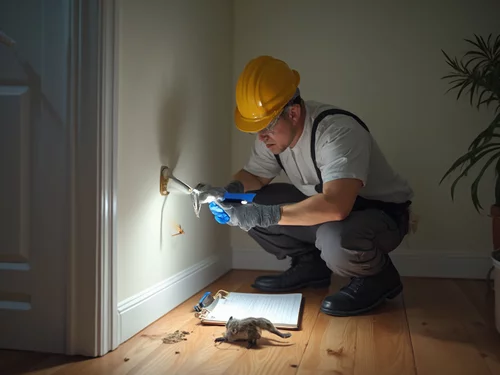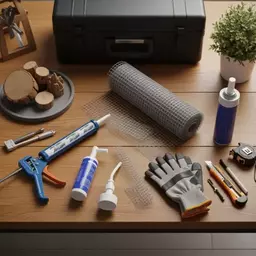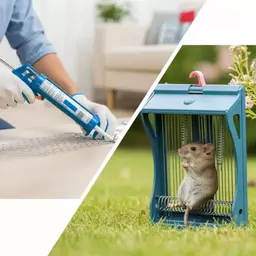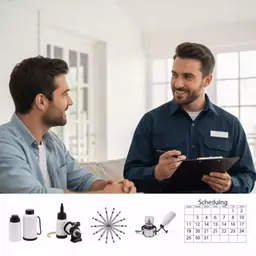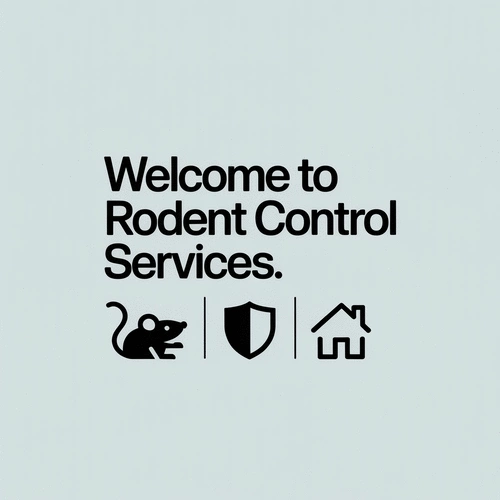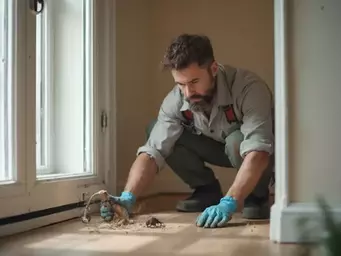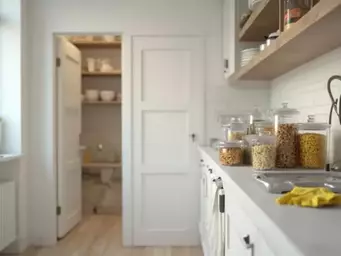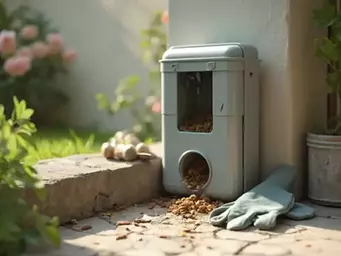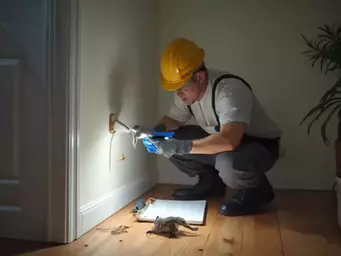Did you know that regular rodent inspections can save you from costly repairs and health hazards? Understanding the importance of these inspections is essential for maintaining a safe environment in any property.
What You Will Learn
- Early detection of rodent activity can significantly reduce extermination costs.
- Implementing preventive measures during inspections can thwart potential infestations.
- Regular inspections help maintain property value and enhance safety for occupants.
- Rodents pose serious health hazards and can cause substantial structural damage.
- Community health can be impacted by rodent infestations, necessitating a collective effort to keep environments clean.
- Proactive measures, such as sealing entry points and maintaining cleanliness, are essential in preventing infestations.
- When serious signs of infestation appear, knowing when to seek professional help is vital.
- Choosing a reputable pest control service is crucial for effective rodent management.
- Adopting an Integrated Pest Management (IPM) approach encourages sustainable and environmentally friendly pest control methods.
Rodent Inspection & Prevention - Key Process Flow
Understanding the steps from initial inspection to professional intervention for effective rodent management.
Step 1:
Initial Inspection & Early Detection
Spotting signs of rodent activity saves on costly extermination and repairs.
- ✓ Comprehensive exterior check
- ✓ Look for droppings & gnaw marks
Step 2:
Proactive Prevention Measures
Implement strategies to reduce risks and maintain a rodent-free environment.
- ✓ Seal entry points
- ✓ Maintain cleanliness
Step 3:
Risk Evaluation & Impact Assessment
Understand health hazards, structural damage, and environmental impacts.
- ✓ Health (diseases)
- ✓ Property (gnawing)
Step 4:
When to Call Professionals
Indicators for professional help, choosing the right company, and IPM.
- ✓ Severe infestation
- ✓ Persistent activity
Understanding the Importance of a Rodent Inspection
As a pest management expert at Rodent Control Services, I can’t stress enough how essential regular rodent inspections are for both homes and offices. These inspections act as the first line of defense against potential infestations, allowing you to catch problems before they escalate. With a proactive approach, you not only save money on repairs but also maintain a safe and welcoming environment for your family or employees!
Regular inspections equip you with the knowledge to identify potential entry points and vulnerable areas that rodents favor. This is especially important during the colder months when rodents seek warmth and food. By having a clear inspection strategy in place, you can effectively protect your space and ensure peace of mind.
Why Regular Rodent Inspections Matter for Homes and Offices
Have you ever wondered why some properties seem to attract rodents while others remain pest-free? The answer often lies in the frequency and thoroughness of their inspections. Here are several reasons why conducting regular rodent inspections is crucial:
- Early Detection: Spotting signs of rodent activity early can save you from costly extermination and repair bills.
- Preventive Measures: Regular inspections allow you to implement preventive measures before an infestation takes hold.
- Property Value Maintenance: Keeping your property rodent-free helps maintain its value and reputation.
- Health Safety: A pest-free environment contributes to the overall health and safety of your space.
By prioritizing these inspections, you’re making a commitment to your property’s safety and sustainability. At Rodent Control Services, we aim to empower our clients with the knowledge they need to keep their spaces rodent-free!
The Risks Associated with Rodent Infestations
Understanding the risks associated with rodent infestations is crucial for everyone. Rodents aren’t just a nuisance; they pose serious risks to health and property. Here are some significant concerns:
- Health Hazards: Rodents can carry diseases such as hantavirus, leptospirosis, and salmonella, which can be transmitted to humans.
- Structural Damage: Rodents love to gnaw on wires, insulation, and wood, potentially leading to costly repairs. Detailed insights into the extensive damage rodents can inflict on infrastructure are highlighted in reports from the USDA Animal and Plant Health Inspection Service.
- Contamination: Rodent droppings and urine can contaminate food supplies and surfaces, leading to health risks.
These risks highlight the importance of not just regular inspections, but also timely action if signs of rodents are detected. Taking a proactive stance helps safeguard your home or office from both immediate threats and long-term repercussions.
Public Health Implications of Rodent Infestations
The implications of rodent infestations extend beyond individual properties — they can have a broader impact on public health. Rodents are known vectors of diseases that can affect entire communities. Here’s what you should know:
- Spread of Diseases: Rodents can contaminate food sources, increasing the risk of foodborne illnesses. Data from New York City's public health records often document the link between rodent activity and public health concerns.
- Impact on Vulnerable Populations: Infestations can disproportionately affect children, elderly individuals, and those with compromised immune systems.
- Community Health Costs: Increased rodent populations can lead to higher public health costs related to disease prevention and control. Government data on rodent inspections can further illustrate the widespread nature of these issues.
Understanding these public health implications is vital for everyone. When we work together to keep our environments clean and rodent-free, we can create safer communities for all!
Pro Tip
Did you know? Regularly inspecting your property not only helps in early detection of rodent activity but also allows you to identify potential entry points. Take the time to seal these gaps with sturdy materials like steel wool, and remember that even the smallest openings can be an invitation for rodents!
Summarizing Key Takeaways from Your Rodent Inspection
After conducting a thorough rodent inspection, it’s essential to summarize the key takeaways to ensure you’re on the right path toward effective rodent management. Here are some vital steps and techniques to keep in mind:
- Always start with a comprehensive exterior check.
- Look for signs of rodent activity, such as droppings and gnaw marks.
- Be thorough when inspecting hotspots like kitchens and basements.
- Document your findings for future reference.
- Create an actionable checklist for ongoing prevention.
These steps not only help in identifying existing issues but also empower you to take proactive measures to maintain a rodent-free environment. Remember, as I often emphasize at Rodent Control Services, the early detection of potential rodent activity can save you from more significant problems down the line!
The Importance of Proactive Measures for Rodent Prevention
Being proactive is crucial in preventing rodent infestations. Regular inspections and maintenance can significantly reduce your risk. Consider implementing the following strategies:
- Seal entry points to keep rodents out.
- Maintain cleanliness in and around your property.
- Store food in airtight containers.
- Keep landscaping trimmed and away from your building.
By prioritizing these measures, you not only protect your property but also contribute to a healthier environment. I encourage clients to think of these actions as investments in the safety and sustainability of their spaces.
Evaluating the Environmental Impact of Rodent Infestations
Rodent infestations can have significant environmental impacts. They can contaminate food, spread diseases, and contribute to structural damage. Here are some critical factors to consider:
- Food contamination: Rodents can spread pathogens through their droppings and urine.
- Structural damage: Gnawing can weaken critical infrastructure.
- Impact on local wildlife: Infestations can disrupt local ecosystems.
At Rodent Control Services, we understand the importance of not only addressing rodent problems but also contributing to a safer environment for our communities. This holistic approach is vital for sustainable pest management!
Next Steps: When to Call in the Professionals
After your inspection, you might find yourself wondering when it’s time to call in the big guns. Here’s how to evaluate your need for professional pest control services.
Evaluating the Need for Professional Pest Control Services
If your inspection reveals signs of a severe infestation, it may be time to seek professional help. Consider these indicators:
- Finding multiple nests or large quantities of droppings.
- Observing ongoing rodent activity despite preventive measures.
- Difficulty in accessing problematic areas for inspection or treatment.
Professional pest control services, like those offered at Rodent Control Services, can deploy advanced techniques to effectively manage rodent issues. Don't hesitate to reach out if you're feeling overwhelmed; we’re here to assist you!
Tips for Choosing the Right Pest Control Company
Choosing the right pest control company can make all the difference. Here are some tips to help you make an informed decision:
- Look for companies with strong customer reviews and testimonials.
- Check their licensing and certifications.
- Ask about their methods and commitment to sustainability.
- Inquire about follow-up services and guarantees.
At Rodent Control Services, we pride ourselves on transparency and customer satisfaction. We encourage potential clients to ask questions—we're always happy to help!
Understanding Integrated Pest Management (IPM) Approaches
Integrated Pest Management (IPM) is a strategic approach that combines various methods for effective pest control. Here’s why you should consider it:
- IPM focuses on long-term prevention strategies.
- It minimizes the use of chemicals, promoting environmental health.
- This approach involves monitoring and understanding pest behavior.
By adopting an IPM approach, you align your pest management strategies with sustainability. At Rodent Control Services, we’re committed to educating our clients about safe and effective pest control methods. Together, we can create a rodent-free environment while safeguarding our ecosystem!
Frequently Asked Questions (FAQs) About Rodent Inspections and Prevention
- Q: Why are regular rodent inspections important?
- A: Regular rodent inspections are crucial for early detection of rodent activity, which can save money on extermination and repairs. They also help implement preventive measures, maintain property value, and ensure health safety by preventing infestations before they escalate.
- Q: What are the main risks associated with rodent infestations?
- A: Rodent infestations pose significant risks including health hazards (transmitting diseases like hantavirus, leptospirosis, and salmonella), structural damage (gnawing on wires, insulation, wood), and contamination of food supplies and surfaces with droppings and urine.
- Q: How can I proactively prevent rodent infestations?
- A: Proactive prevention measures include sealing entry points, maintaining cleanliness in and around your property, storing food in airtight containers, and keeping landscaping trimmed and away from buildings.
- Q: When should I call professional pest control services?
- A: You should consider calling professionals if you find multiple nests or large quantities of droppings, observe ongoing rodent activity despite your preventive efforts, or have difficulty accessing problematic areas for inspection or treatment.
- Q: What is Integrated Pest Management (IPM)?
- A: Integrated Pest Management (IPM) is a comprehensive approach to pest control that combines various strategies for long-term prevention. It focuses on minimizing chemical use, promoting environmental health, and understanding pest behavior to create sustainable solutions.
Recap of Key Points
Here is a quick recap of the important points discussed in the article:
- Regular Inspections: Conducting frequent rodent inspections is crucial for early detection and prevention of infestations.
- Health & Safety Risks: Rodents can carry diseases and cause structural damage, making inspections vital for maintaining a safe environment.
- Proactive Measures: Seal entry points, maintain cleanliness, and store food properly to prevent rodent access.
- Community Health: Rodent infestations can impact public health, underscoring the need for collective efforts in pest management.
- Professional Help: Seek professional pest control services when signs of severe infestations are present for effective management.

